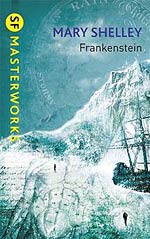
![]() Tar Daddoo
Tar Daddoo
1/14/2013
![]()
What is the Science Fiction Premise?
In Frankenstein, we are asked to accept that a scientist develops the means to "reanimate" a collection of human parts to bring a new person to life. As it turns out this new being is somewhat hideous and is referred to as the monster.
Is the science of the premise explored?
Keeping in mind that Frankenstein was released in 1818 there is an exploration of a scientific way of thinking about the monster's creation. It seems a little far-fetched in light of 200 years of scientific advancement. Nevertheless, it is clear that the author's intention is to convey a sense of scientific plausibility.
Is the impact of the premise on an individual explored?
The bulk of the story is about the impact that the creation of the monster has on both the creator and his creation. The impact on the monster can be traced back to the science fiction premise. The impact on the creator appears to derive from personality traits that precede the invention.
Is the impact of the premise on society explored?
For the most part, Frankenstein stops short of exploring the impact of the monster's creation on society. Shelley does, however, offer some insights into the role that society plays in moral development.
How well written is the story?
Sadly, I found Frankenstein quite difficult to read. Some of this is due to old ways of speaking/writing that are no longer prevalent. For this, it was very useful to have an annotated copy with footnotes to explain these old usages.
In addition, I found the language adopted in the book excessively ornate. I am informed that some of this was due to Mary Shelley's husband's influence on her work. In any case, in the middle of the book, the monster tells his tale. This section is far more readable and thoroughly engaging. I wish the beginning and end could have been as easy to read.
Can I recommend the book?
If you are at all interested in Science Fiction as a literary form, then you must read Frankenstein. Some have argued that this is the first book of Science Fiction. Of course, this is a difficult contest to win or even adequately resolve. Nevertheless, I am inclined to agree. At the age of 21, in 1818 -- shortly after the death of Jane Austen and shortly before the birth of Louis Pasteur -- Mary Shelley offers us one of the earliest books in which science is used as the explanatory framework for an otherwise fantastic idea. This is the hallmark of Science Fiction.
Even if you are not a student of Science Fiction, you might want to read Frankenstein simply to clear away some of your mistaken beliefs about the story. Though the events in the story are horrific, they are not random or unmotivated. Though bad things happen from pursuing ill-understood science, the indictment is less for pursuing the science than for failing to take responsibility for its consequences. And, though the monster is cruel and enigmatic, he is not inarticulate. He does explain himself and in the process provides a non-religious perspective on the roots of ethical behavior.
Tar Daddoo